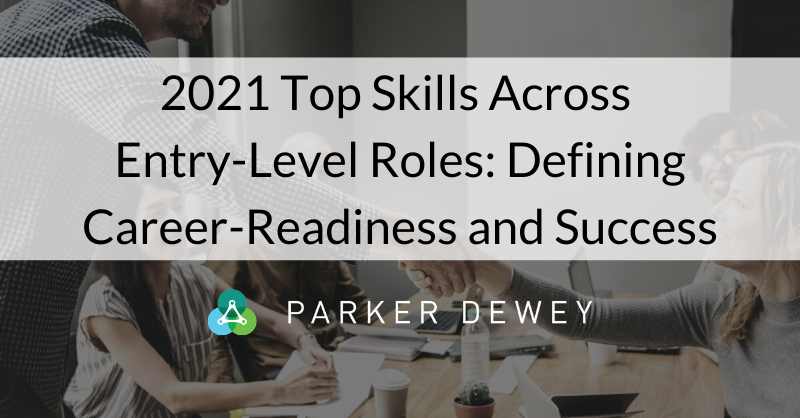.png)
Why Remote Experiential Recruiting Belongs in Your Tool Box
Last week, LinkedIn senior editor George Anders asked: Would you rather work on-site, remote, or hybrid?
The question stemmed from Amazon’s decision to offer up all three options for its latest batch of summer interns. 60% chose hybrid.
From my perspective, unless there is an extenuating circumstance, every college student should want on-site (or hybrid with mostly on-site). And this is coming from someone whose organization is all about creating remote work opportunities for college students and recent graduates!
As we highlighted in last week’s webinar on recruiting post-pandemic, companies and Career Launchers alike should think of remote work as an integral part of the career exploration and recruiting process, not as a replacement for on-site internships or full-time roles. While remote Experiential Recruiting tools like Micro-Internships can help build relationships between companies and candidates as a pathway to hiring, on-site provides greater opportunities for the informal professional development and relationship building that are vital for those launching their careers, and core for companies to develop their talent.
Be sure to check out our webinar recap for more insights on why remote experiential recruiting belongs in your company’s portfolio of virtual tools.
Jeffrey Moss, Founder and CEO
Articles of the Week
Reinventing University Recruiting: (Kinda) Post COVID-19 - Parker Dewey
Prominent soft skills for the future of learning and work - Chief Learning Officer
The Most Common Hiring Methods Don’t Work - ERE
You Asked, They Answered: How You Spent Your Pandemic - Parker Dewey
Reinventing University Recruiting: (Kinda) Post COVID-19 - Parker Dewey
“In reimagining hiring strategies, recruiters are asking: What remote practices should stay? What processes are in need of a refresh? What ‘tried-and-true’ programs are ready to be retired?”
With so many campuses planning to reopen for fall, it’s time to look at how we recruit early career professionals—to build something that actually works. In this webinar, Parker Dewey CEO and founder Jeffrey Moss covered how companies can access, engage, assess, and convert students in the evolving almost-post-COVID-19 world. Check out this post for the summary and a link to the full replay.
Related reading: The Ultimate Win-Win-Win: Creating a Micro-Internship Sponsorship Program
Prominent soft skills for the future of learning and work - Chief Learning Officer
“Soft skills have always been significant, but the pandemic’s impact on where we work and how we work have now made the development of soft skills urgent...Where we work and how we work has changed, and therefore, how we measure students’ preparedness for work should change too (GPA, I’m looking at you).”
Lawrese Brown calls soft skills “the most important interconnection between education and employability.” And while entry-level job postings often emphasize soft skills (though we prefer the term “core skills”), they don’t always clearly articulate how soft skills inform different facets of the job. This article unpacks five soft skill terms commonly used in entry-level job descriptions and how they enable individuals to be more productive in any given role.
Related reading: Soft Skills Rank at the Top of the List for In-Demand Entry-Level Professional Roles
The Most Common Hiring Methods Don’t Work - ERE
“Structured interviews, cognitive ability tests, and work-sample tests are five times more accurate [than the most common hiring practices]. Combine them to ensure that you hire the right people and never miss great candidates.”
When it comes to assessing candidates, companies often rely on non-predictive measures, like academic pedigree, resume, and GPA—and there’s even data to back up the low efficacy of traditional hiring signals. This article takes a look at common hiring methods ranked by their predictive validity, a correlation between screening test scores and actual job performance. And where markers like pedigree, unstructured interviews, and age are “basically useless” and “counterproductive,” work-sample tests (a “sample of actual work to do”) ranked highest in predictive validity. (Unlike other work-sample tests, though, Micro-Internships are always paid—allowing companies to provide equitable opportunities for all potential candidates.)
Related reading: Here’s Why Micro-Internships are Always Paid
You Asked, They Answered: How You Spent Your Pandemic - Parker Dewey
Each month, we ask the experts (that’s you!) to weigh in on one question submitted by a career launcher. This month’s question addressed how students and recent graduates can best frame their experiences over the last year. Interested in joining our panel of experts and sharing your insights on these monthly questions? Let us know!
Related reading: You Asked, They Answered: GPA Requirements
For more stories and insights on HR, recruiting, and diversity, click here to subscribe to our weekly newsletter Hire Learnings.




